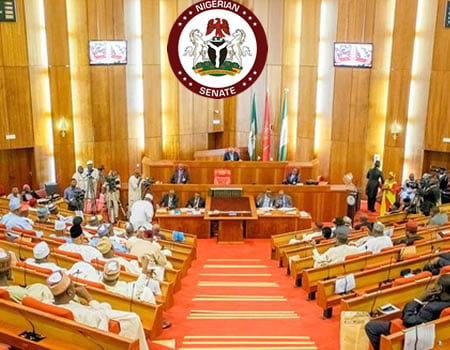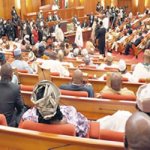This was as the senators, at the session, passed the Whistle-blowers Protection Bill, one of the anti-graft bills being looked forward to by the present administration in the fight against corruption.
The chamber had suspended the process after the confirmation of 15 REC nominees, following the anger among senators who protested comments credited to Acting President Yemi Osinbajo, which indicated that the lawmakers lacked the power to confirm certain nominees.
The senators demanded that the acting president withdrew the statement.
Though the statement had not been withdrawn, the Senate resumed clearance of executive nominees at the Wednesday’s sitting when the Senate Committee on Independent National Electoral Commission (INEC), headed by Senator Suleiman Nazif, laid the report of the screening of the 12 remaining REC nominees before the chamber.
Senate Leader, Senator Ahmed Lawan, had laid the foundation for the submission of the report when he read the names of the 12 nominees and asked the committee chairman to lay the report on the table.
The Senate Leader had read out the names of the nominees: Mrs Asmanu Sani Maikudi (Katsina); Sam Olugbadebo Olumekun (Ondo); Mahmud Isah (Kebbi); Rufus Oloruntoyin Akeju (Lagos); Riskuwa Shehu (Sokoto); Kassim Gana Geidam (Yobe); Jibrin Ibrahim Zarewa (Kano); Abdulganiyu Olayinka Raji (Oyo); Samuel Egwu (Kogi); Mike Igini (Delta); Mustapha Zubairu (Niger) and Ahmad Bello Mahmud (Zamfara).
The whistle-blower protection bill, which passed the mandatory third reading, was immediately hailed by the Senate President, Dr Bukola Saraki, as a major weapon in line with the anti-corruption war in the country.
The passage of the bill was sequel to a report presented to that effect by its Committee on Judiciary, Human Rights and Legal Matters, headed by Senator David Umaru.
Specifically, “the bill seeks to ensure that persons who make
disclosures and persons who may suffer reprisals in relation to such disclosures are protected under the law just as it also specifies who is qualified to make disclosure of improper conduct; the procedure for making disclosures; and the protection due to ‘whistleblowers.’
“Under the newly passed Bill, a person who makes a disclosure shall not be subjected to victimisation by his or her employers or by fellow employees.
“Additionally, a person who makes a disclosure has the right to take legal action if he or she is victimised, dismissed, suspended, declared redundant, transferred against his or her will, harassed or intimidated in any manner.”
The bill also legalised the Federal Government’s five per cent reward policy for whistle-blowers by guaranteeing that the equivalent of five per cent of the amount recovered be given to the genuine whistle-blower.
However, in the bill, punitive measures against false whistle- blowers were fine of N10 million or five years imprisonment for such persons.
Speaking on the passage of the Bill, Saraki said “this is a promise kept. Today, we have passed a landmark piece of legislation to fight corruption and protect patriotic Nigerians who are fighting corruption.”
WATCH TOP VIDEOS FROM NIGERIAN TRIBUNE TV
- Let’s Talk About SELF-AWARENESS
- Is Your Confidence Mistaken for Pride? Let’s talk about it
- Is Etiquette About Perfection…Or Just Not Being Rude?
- Top Psychologist Reveal 3 Signs You’re Struggling With Imposter Syndrome
- Do You Pick Up Work-Related Calls at Midnight or Never? Let’s Talk About Boundaries






